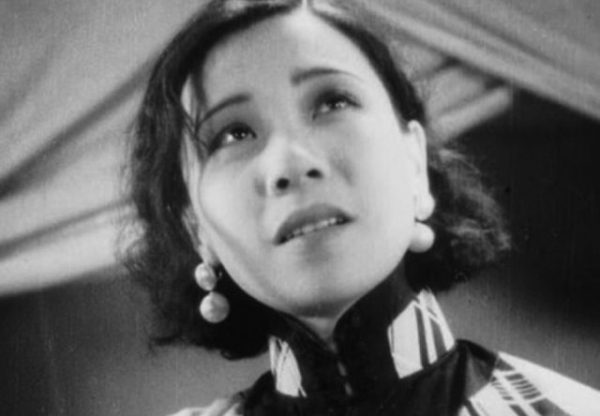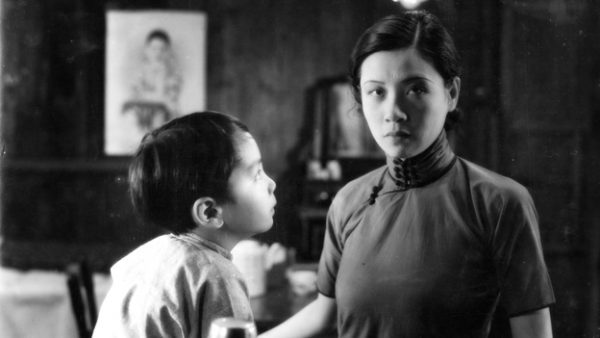
Iconic Chinese star Ruan Lingyu gives one of her best performances in silent classic The Goddess
THE GODDESS (SHEN NU) (Wu Yonggang, 1934)
Film Society of Lincoln Center, Walter Reade Theater
144 West 65th St. between Eighth Ave. & Broadway
Thursday, December 21, 8:30
Series runs December 13 – January 7
212-875-5050
www.filmlinc.org
 Wu Yonggang’s directorial debut, The Goddess, made for Lianhua Film Company after he worked as a designer for the Shaw brothers, is a socially conscious, emotive tale about one woman’s struggle to give her young son a better life than her own. The seventy-three-minute silent film opens with a series of shots by cinematographer Hong Weilie that follows the evening light, from the setting sun to a man on a ladder lighting a street corner oil lamp to an apartment window seen from the outside. Wu then cuts to inside the room, revealing a dressing table with lots of makeup, then a pair of dresses hanging on the wall, and a doll. The camera next rises from an empty basket on the floor to a nervous woman (Ruan Lingyu) cradling a baby. She looks at a clock; it is time for her to leave her child and walk the streets of the city to make money. It’s a melancholy scene in a melancholy film, but the unnamed prostitute is no mere hooker with a heart of gold; she is a determined yet fragile woman who will do anything for her son, Shuiping (Keng Li). Running from the police, she is helped by Zhang (Zhang Zhizhi), a low-level gangster who decides to become her pimp, regularly taking her money and threatening her future, and that of her son’s. Whenever she attempts to raise her station, particularly when she saves enough money to send Shuiping to private school, there is always something that brings her back down.
Wu Yonggang’s directorial debut, The Goddess, made for Lianhua Film Company after he worked as a designer for the Shaw brothers, is a socially conscious, emotive tale about one woman’s struggle to give her young son a better life than her own. The seventy-three-minute silent film opens with a series of shots by cinematographer Hong Weilie that follows the evening light, from the setting sun to a man on a ladder lighting a street corner oil lamp to an apartment window seen from the outside. Wu then cuts to inside the room, revealing a dressing table with lots of makeup, then a pair of dresses hanging on the wall, and a doll. The camera next rises from an empty basket on the floor to a nervous woman (Ruan Lingyu) cradling a baby. She looks at a clock; it is time for her to leave her child and walk the streets of the city to make money. It’s a melancholy scene in a melancholy film, but the unnamed prostitute is no mere hooker with a heart of gold; she is a determined yet fragile woman who will do anything for her son, Shuiping (Keng Li). Running from the police, she is helped by Zhang (Zhang Zhizhi), a low-level gangster who decides to become her pimp, regularly taking her money and threatening her future, and that of her son’s. Whenever she attempts to raise her station, particularly when she saves enough money to send Shuiping to private school, there is always something that brings her back down.

A prostitute (Ruan Lingyu) dreams of a better life for her son (Keng Li) in Wu Yonggang’s The Goddess
Writer-director Wu also designed the sets, which include German Expressionist-type buildings and alleyways along with blinking neon towers and stores. Large columns increase in number, as if creating bars around the woman. Holding on to Shuiping, the woman is seen through Zhang’s spread legs, trapped. Using soft focus, superimposition, and slow fades — the camera cannot get enough of Ruan’s expressive face — Wu depicts her nightly travails as she smokes cigarettes and looks for her next customer. In one memorable scene, Wu shows only feet on the sidewalk as she is propositioned and accepts. But he never sentimentalizes the fallen woman, instead making her a tragic example of societal ills in 1930s China, especially gender and class hierarchies, as explained by the school’s principal. “She is a human being and has her human rights — so does her son,” he says. Unfortunately, most everyone else does not agree. The Goddess is a silent film classic, a major success in China; Wu (The Desert Island, Loyal Family) remade it with sound in 1938 as Rouge Tears. Sadly, Ruan, a huge star, had serious personal problems and committed suicide in 1935, at the age of twenty-four, a victim of gossip and physical abuse; Stanley Kwan’s award-winning 1992 biopic, Centre Stage, detailed her life, with Maggie Cheung playing Ruan. (Visual artist Isaac Julien re-created scenes from The Goddess with Zhao Tao and also cast Cheung as Goddess of the Sea in his nine-screen 2013 MoMA installation, Ten Thousand Waves.) The Chinese title, shennü, refers to both a goddess and a prostitute; Wu, and Ruan, reveals that one does not preclude the other. The Goddess is screening December 21 at the Walter Reade Theater in the Film Society of Lincoln Center series “Emotion Pictures: International Melodrama,” with live piano accompaniment by Donald Sosin. The series, which divides its more than fifty films into four categories — Silent Screen, Hollywood’s Golden Age, International Classics, and Modern/Postmodern Drama — continues through January 7 with works by Yasujirô Ozu, Arturo Ripstein, Charlie Chaplin, Pedro Almodóvar, Clint Eastwood, Guy Maddin, Douglas Sirk, Leo McCarey, Rainer Werner Fassbinder, Vincente Minnelli, Terence Davies, and many more.